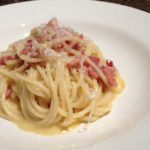Spaghetti Carbonara is a classic Italian pasta dish that has captured the hearts and palates of food enthusiasts around the world. Renowned for its simplicity, yet rich and indulgent flavors, this iconic Roman recipe is a testament to the art of Italian cuisine. The dish, with its roots deeply embedded in the Lazio region of Italy, is a celebration of few, high-quality ingredients harmoniously combined to create a dish that is both comforting and sophisticated.
At its core, Spaghetti Carbonara is a pasta dish featuring al dente spaghetti noodles enveloped in a velvety sauce made from eggs, Pecorino Romano cheese, guanciale (cured pork cheek), and black pepper. The magic of Carbonara lies in the way these humble components come together to form a creamy, savory masterpiece. What sets it apart is the absence of a traditional tomato-based sauce, allowing the rich, golden-hued Carbonara sauce to take center stage.
In this exploration of Spaghetti Carbonara, we’ll delve into the history of the dish, the key ingredients that contribute to its distinctive flavor, and a step-by-step guide on how to recreate this beloved classic in your own kitchen. So, let’s embark on a culinary journey through the enchanting world of Spaghetti Carbonara!
How to cook Spaghetti Carbonara
Spaghetti Carbonara
Ingredients
- 200 g 7 oz spaghetti
- 100 g about 3.5 oz guanciale or pancetta, diced
- 2 large eggs
- 1 cup about 100g Pecorino Romano cheese, grated
- Freshly ground black pepper
- Salt
- Optional: Chopped parsley for garnish
Instructions
Boil the Pasta:
- Bring a large pot of salted water to a boil.
- Cook the spaghetti according to package instructions until al dente.
Prepare the Sauce:
- While the pasta is cooking, whisk together the eggs, grated Pecorino Romano cheese, and a generous amount of freshly ground black pepper in a bowl. Set aside.
Cook the Guanciale:
- In a skillet over medium heat, cook the diced guanciale or pancetta until it becomes crispy, about 4-5 minutes. Remove from heat.
Combine Pasta and Sauce:
- Once the pasta is cooked, reserve about 1/2 cup of pasta cooking water and drain the rest.
- Immediately toss the hot pasta with the egg and cheese mixture. The heat from the pasta will cook the eggs and create a creamy sauce.
- Add the cooked guanciale (or pancetta) and toss until well combined. If the sauce is too thick, add a bit of the reserved pasta water to achieve the desired consistency.
Serve:
- Divide the Carbonara between two plates.
- Garnish with additional Pecorino Romano cheese, black pepper, and chopped parsley if desired.
Nutrition (Approximate per serving)
- Calories: 600-700 kcal
- Protein: 25g
- Carbohydrates: 60g
- Fat: 30g
- Fiber: 3g
It’s important to note that these values are approximate and can vary based on factors such as the type and brand of ingredients used. Additionally, the nutritional information provided here accounts for the classic version of Spaghetti Carbonara and may differ if variations or substitutions are made in the recipe.
Always consider your specific dietary needs and adjust the ingredients accordingly. If you have specific dietary restrictions or health concerns, it’s advisable to consult with a nutritionist or healthcare professional for personalized advice.
Why is Spaghetti Carbonara considered as healthy food?
While Spaghetti Carbonara is a delicious and satisfying dish, it may not be traditionally considered a “healthy” food in the context of being low in calories or fat. However, like many dishes, it can be part of a balanced diet when enjoyed in moderation. Here are a few aspects to consider:
- Moderation is Key: The key to enjoying Spaghetti Carbonara in a balanced diet is moderation. It’s rich in flavor and can be quite filling, so moderate portion sizes are advisable.
- Protein and Carbohydrates: The dish contains protein from the eggs and guanciale or pancetta, and carbohydrates from the pasta. Protein is essential for muscle maintenance and repair, while carbohydrates provide energy.
- Quality Ingredients: When made with high-quality, fresh ingredients, Spaghetti Carbonara can offer nutritional benefits. Eggs provide essential proteins and nutrients, and Pecorino Romano cheese contributes calcium and other minerals.
- Fats: While it does contain a notable amount of fat, much of it comes from unsaturated fats found in ingredients like olive oil and the fat from the cured pork. These fats, in moderation, can be part of a healthy diet.
- Balanced Meal: You can enhance the nutritional profile of your meal by pairing Spaghetti Carbonara with a side of vegetables or a fresh salad to increase fiber and micronutrient content.
It’s important to note that what is considered “healthy” can vary based on individual dietary needs, preferences, and health goals. If you have specific dietary concerns or health conditions, it’s advisable to consult with a healthcare professional or a registered dietitian who can provide personalized advice based on your individual needs and goals.
